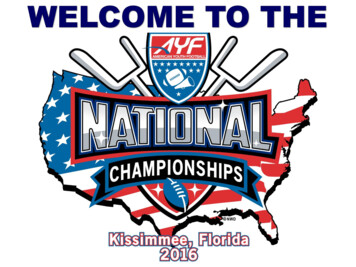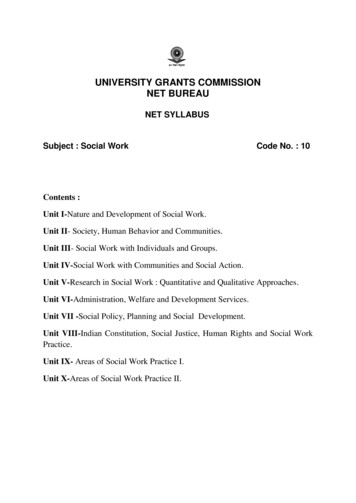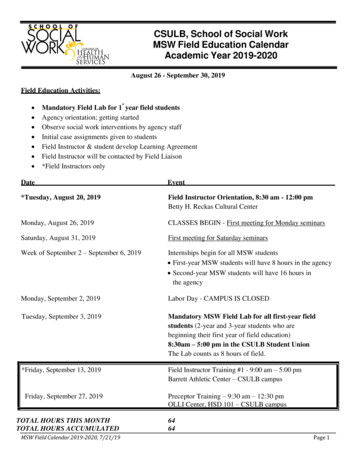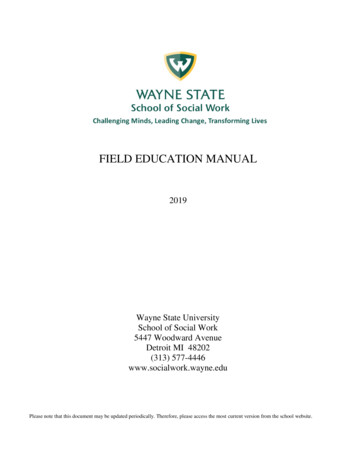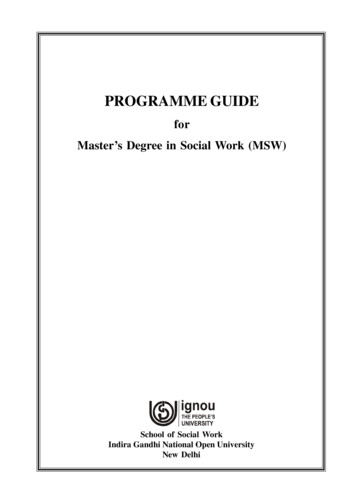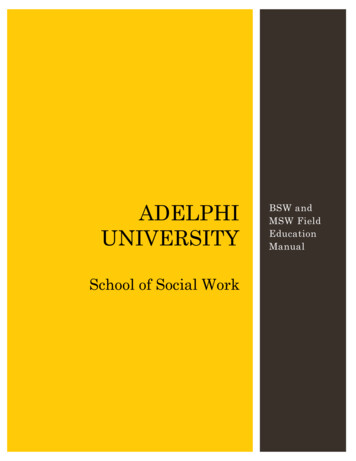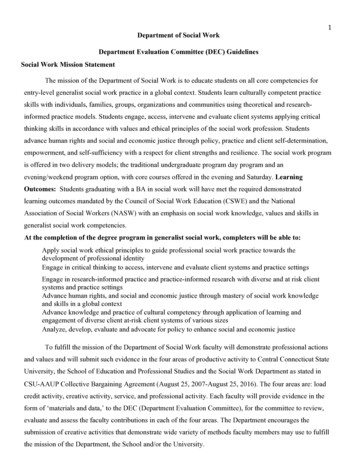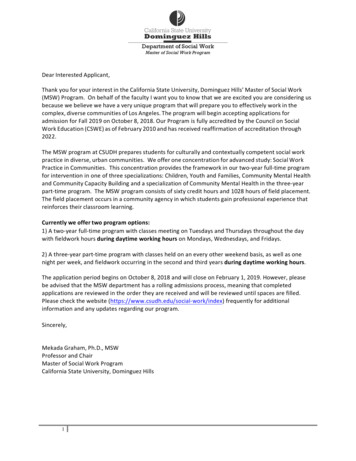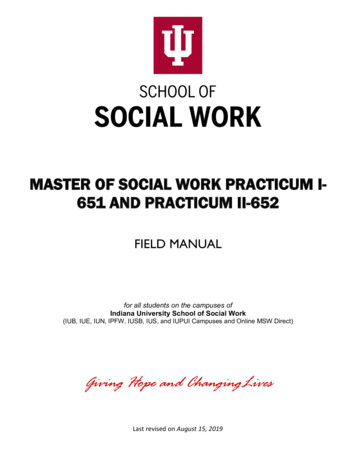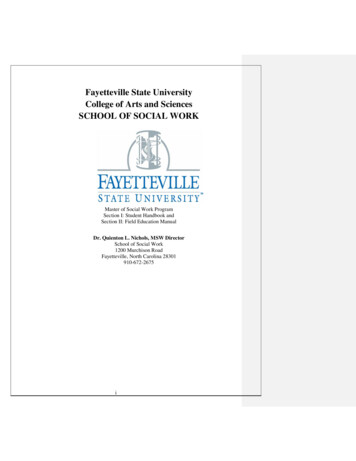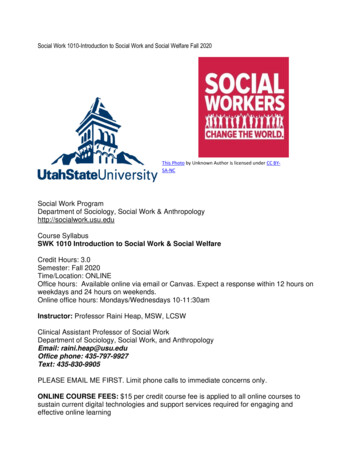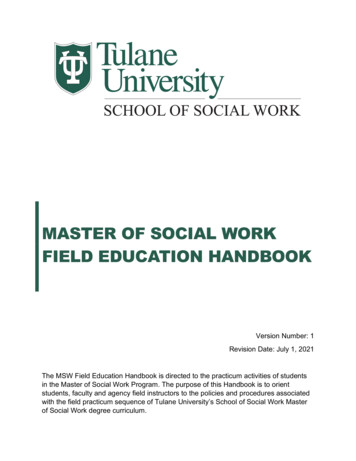
Transcription
MASTER OF SOCIAL WORKFIELD EDUCATION HANDBOOKVersion Number: 1Revision Date: July 1, 2021The MSW Field Education Handbook is directed to the practicum activities of studentsin the Master of Social Work Program. The purpose of this Handbook is to orientstudents, faculty and agency field instructors to the policies and procedures associatedwith the field practicum sequence of Tulane University’s School of Social Work Masterof Social Work degree curriculum.
July 1, 2021Greetings Students, Field Instructors, and Faculty!We are pleased to present the 2021 Edition of the Field EducationInstruction Handbook for the Tulane University Social of Social WorkMaster’s Program. This is a guide and is not an exhaustive tool.Field Education’s history dates back to the nineteenth century and remainsa major learning component for an MSW degree. More than half of ourstudents’ academic time is spent in field education settings and ourgraduates earn a minimum of 900 hours of practice-based learning.Effective practice-based learning involves a process that includes abalance of educational learning experiences, effective supervision and taskmanagement, and reflective thinking that embodies empirically-basedethical social work practices. Our department is committed to providing ahigh quality clinical-community field education experience. Yoursuggestions and feedback on ways that this handbook can be more usefulare welcome.Yours Truly,Maurya W. Glaude, PhD, MSW, LCSW-BACSDirector of Field EducationTulane University School of Social WorkMSW Field Education HandbookPage 2
ORGANIZATIONAL OVERVIEWTSSW’S MISSIONThe Tulane School of Social Work’s mission is to enhance the well-being and equitabletreatment of diverse individuals and communities through transformative education,generation of knowledge, service, and community engagement.TSSW’S MSW PROGRAM GOALSThe Tulane University School of Social Work Master of Social Work Program:1. Prepares students to engage in relationship-centered, clinical-communitypractice to enhance the biopsychosocial capacity and resilience of individuals,families, groups, organizations and communities;2. Teaches students to value human diversity and work to promote social andeconomic justice;3. Prepares students to create and exchange responsive, community-basedknowledge and research for relevant, effective, and innovative social workpractice; and4. Promotes integrative learning by drawing from and contributing to the diverse,culturally rich, inspiring, and challenging environment of New Orleans andthrough opportunities for intercultural experience.TSSW’S INTEGRATED CLINICAL AND COMMUNITYPRACTICEIntegrated Clinical and Community Practice is an interactive process that highlights thedual context of understanding and working with people and groups within theircommunities. It recognizes the interrelatedness, strengths, and needs of the individual,family, organization, and community as the focus of growth and change. Areas that givemeaning to people and which are of primary importance for social work include thephysical and psychological dimensions, as well as environmental forces such as socialand economic justice.The clinical-community model of the curriculum utilizes theories and interventions thataddress the conditions of individuals, families, groups, organizations, communities, andgovernment to effect changes on multiple levels based on a person-in-environmentperspective.Tulane University School of Social WorkMSW Field Education HandbookPage 3
The curriculum further emphasizes the concepts of relationship-centered, reflectivepractice with systems of different sizes and in different service contexts. Relationshipcentered practice is a collaborative approach that values and utilizes the importance ofrelationship as the central vehicle for maximizing opportunities for growth and change,both within the practice setting and within the clients’ environments. This course ofstudy is designed to offer the best clinical and community training that addresses theunique needs of individuals, families, groups, organizations, and communities. Studentsin the program enjoy a variety of learning experiences, including traditional and nontraditional class experiences. Team projects, problem-based learning, creativesimulation, team teaching, field work, and electronic learning exchanges are just someof the enriching experiences you will enjoy while fulfilling the requirements for theMaster of Social Work.The curriculum also instructs and encourages the learner to begin the life-long processof becoming a reflective practitioner. A reflective practitioner is one who consciouslydraws on internal and external resources to define and critically examine problems aswell as to suggest solutions, drawing from theoretical concepts, evidence-basedpractice, subjugated knowledge, culture, ethics, and practice wisdom. The concept of areflective practitioner also refers to a social worker who has a full understanding of hisor her own personal values and the genesis of these values, and of the relationshipbetween his or her values and the values of the profession. The reflective practitionerhas the ability to critically evaluate and modify his or her practice over time and toengage in practice that best addresses the needs of the client. The reflectivepractitioner is one who internalizes professional values and ethics and who isresponsive to the values of others and engages in culturally sensitive practice. Further,the reflective practitioner engages in mindfulness and critical thinking, learns fromexperience, uses Evidence-Based Practice principles, and possesses strongprofessional knowledge that enables the social worker to continually improve his or herpractice and to best meet the needs of clients over time.Tulane University School of Social WorkMSW Field Education HandbookPage 4
TABLE OF CONTENTSContentsOrganizational Overview . 3TSSW’s Mission. 3TSSW’s MSW Program Goals . 3TSSW’s Integrated Clinical and Community Practice . 3Table of Contents . 5CHAPTER I: THE FIELD PRACTICUM. 9RELATIONSHIP OF THE FIELD EXPERIENCE TO THE OVERALL CURRICULUM. 10PREREQUISITES FOR FIELD PRACTICUM . 10GENERALIST PRACTICE FIELD INSTRUCTION . 11Objectives of Generalist Practice Field Instruction . 11Self-paced Asynchronous Orientation to Field Education Modules (Required) . 12Generalist Practice Field Practicum (SOWK 7520, 7910, & 7920) . 13Generalist Practice Field Seminar . 13SPECIALIZED PRACTICE FIELD INSTRUCTION . 13Objectives of Specialized Practice Field Instruction . 14Specialized Practice Field Instruction Course Descriptions . 15CHAPTER II: ROLES AND RESPONSIBILITIES . 17DIRECTOR OF FIELD EDUCATION . 17SENIOR PROGRAM COORDINATOR FOR FIELD EDUCATION . 18FACULTY FIELD LIAISON . 18FIELD INSTRUCTORS. 19MSW STUDENTS. 20CHAPTER III: PROCEDURES FOR PRACTICUM PLACEMENT . 22ASSIGNING STUDENTS TO FIELD PLACEMENTS . 22FIELD PLACEMENT PROCESS FOR ON-CAMPUS STUDENTS. 22Field Placement Selection Process . 23The Interview Process. 24FIELD PLACEMENT PROCESS FOR ONLINE STUDENTS . 25Tulane University School of Social WorkMSW Field Education HandbookPage 5
INTERVIEWING FOR A FIELD PLACEMENT: HELPFUL HINTS FOR STUDENTS 26Before the Interview . 26The Interview. 26Decision Making . 28APPLICATION FOR FIELD PRACTICUM . 29CHAPTER IV: PRACTICUM POLICIES . 33ABSENCES FROM FIELD PLACEMENT VACATIONS, HOLIDAYS . 33SICK LEAVE AND PERSONAL EMERGENCIES . 33ATTENDANCE AT SOCIAL WORK CONFERENCES/MEETINGS. 33CRIMINAL BACKGROUND CHECKS, DRUG SCREENINGS, AND VERIFICATIONOF HEALTH STATUS . 34DISABILITY POLICY FOR FIELD EDUCATION . 34DRESS CODE . 35DUAL DEGREE PLACEMENT REQUIREMENTS . 35CERTIFICATE PROGRAMS PLACEMENT REQUIREMENTS . 36DUAL RELATIONSHIPS . 36EVALUATIONS/GRADING . 37FIELD LIAISONS . 38HOME VISITS . 38INFORMATION SHARING . 38OPEN IDENTIFICATION OF STUDENT STATUS . 39PERSONAL CONDUCT . 39PRIVATE CONDUCT . 39RESPECT. 40UNETHICAL CONDUCT OF COLLEAGUES . 40PROFESSIONAL ETHICS . 40PROFESSIONAL LIABILITY AND HEALTH INSURANCE . 41REQUIRED HOURS OF INTERNSHIP . 41SAFETY. 42SEXUAL HARASSMENT POLICY. 42SOCIAL MEDIA GUIDELINES . 43SOCIAL MEDIA USE AND PERSONAL CONDUCT . 45STUDENT SERVICES TO CLIENTS. 46Tulane University School of Social WorkMSW Field Education HandbookPage 6
TRANSPORTING CLIENTS . 46USE OF PERSONAL VEHICLES . 46WORK-SITE PLACEMENTS . 46CHAPTER V: PROCEDURES FOR ADDRESSING PROBLEMS IN FIELD . 48IDENTIFYING THE STUDENT WHO IS EXPERIENCING PROBLEMS IN THE FIELDPRACTICUM . 48POSSIBLE OUTCOMES . 49REMOVAL OF A STUDENT FROM FIELD: REASONS FOR REMOVAL . 49PROCEDURES FOR REMOVAL OF A STUDENT FROM FIELD. 50CHAPTER VI: ETHICAL STANDARDS. 52CHAPTER VII: LEARNING GOALS AND EVALUATIONS. 53GENERALIST PRACTICE FIELD PRACTICUM LEARNING GOALS . 55GENERALIST PRACTICE PRACTICUM EVALUATION OF STUDENTPERFORMANCE . 59Generalist Practice Field Practicum Evaluation of Student Performance* . 60Foundation Field Practicum Evaluation of Student Performance* . 61SPECIALIZED PRACTICE FIELD PRACTICUM LEARNING GOALS . 66SPCIALIZED PRACTICE FIELD PRACTICUM EVALUATION OF STUDENTPERFORMANCE . 71Specialized Practice Learning Goals. 72Specialized Practice Field Practicum Evaluation of Student Performance* . 73CHAPTER VIII: CURRICULUM OF THE SCHOOL FOR THE MASTER OF SOCIALWORK DEGREE . 78GOALS OF THE TULANE SCHOOL OF SOCIAL WORK . 78CURRICULUM SEQUENCE . 78EDUCATIONAL POLICY AND ACCREDITATION STANDARDS . 79CSWE GENERALIST COMPETENCIES AND PRACTICE BEHAVIORS . 79TSSW COMPETENCIES AND SPECIALIZED PRACTICE BEHAVIORS . 85TSSW MSW Curriculum Plans . 90Chapter IX: POLICIES AND PROCEDURES FOR THE APPROVAL ANDEVALUATION OF FIELD INSTRUCTION AGENCIES AND FIELD INSTRUCTORS . 95CRITERIA FOR SELECTION OF AGENCY SETTINGS . 95SCHOOL-PLACEMENT AGREEMENT . 96CRITERIA FOR SELECTION OF FIELD INSTRUCTORS . 96Tulane University School of Social WorkMSW Field Education HandbookPage 7
TASK SUPERVISOR MODEL . 97Task Supervisor . 97Off-site MSW Field Instructor . 98RELATIONSHIP OF FIELD FACULTY TO SCHOOL . 98EVALUATION OF THE FIELD PRACTICUM AND FIELD INSTRUCTORS . 98CHAPTER X: ADMINISTRATIVE POLICIES . 100PROCEDURES FOR PROBLEM RESOLUTION . 100General Information . 100Identifying the Student who is Experiencing Problems in the Field Practicum . 101Possible Outcomes . 101REMOVAL OF A STUDENT FROM FIELD . 102Reasons for Removal. 102Procedures for Removal of a Student from Field . 103CONTRACT REGARDING INCOMPLETE WORK . 105ACADEMIC STANDARDS . 106STUDENT PROFESSIONAL AND ETHICAL STANDARDS . 106ACADEMIC GRIEVANCE AND APPEALS . 106REPORTING DISCRIMINATION AND OTHER CONCERNS . 106Appendices . 108FIELD VISIT REPORT (completed electronically) . 108RISK MANAGEMENT STRATEGIES . 109General . 109Home Visit Precautions . 110LIABILITY INSURANCE FOR SOCIAL WORK STUDENTS . 111Student Liability Insurance Coverage. 111Revision History . 112Tulane University School of Social WorkMSW Field Education HandbookPage 8
CHAPTER I: THE FIELD PRACTICUMThe purpose of the field practicum is to provide an educationally directed practiceexperience for the MSW student. Historically, the partnership between social serviceagencies and social work education has been an essential one. The supervised practiceexperience provided by social service agencies for the education of social workstudents has been called, “field placement,” “field instruction,” “practicum” or“internship.”The Council on Social Work Education (CSWE) has identified field education as thesignature pedagogy of social work education:“Signature pedagogy represents the central form of instruction and learning in which aprofession socializes its students to perform the role of practitioner. Professionals havepedagogical norms with which they connect and integrate theory and practice. In socialwork, the signature pedagogy is field education. The intent of field education is toconnect the theoretical and conceptual contribution of the classroom with the practicalworld of the practice setting. It is a basic precept of social work education that the twointerrelated components of curriculum-classroom and field-are of equal importancewithin the curriculum, and each contributes to the development of the requisitecompetencies of professional practice. Field education is systematically designed,supervised, coordinated, and evaluated based on criteria by which studentsdemonstrate the achievement of program competencies” (CSWE, 2008).At Tulane University School of Social Work, one sequential three-semester fieldplacement is provided through the agency/school partnership for full-time students andone sequential six-semester field placement is provided for part-time students. This isreferred to as “field practicum.” The professional social workers in agencies who providethe educational supervision to students are referred to as “field instructors.”Student experiences in field practicum are designed to meet educational objectivesspecified for the three semesters (full-time enrollment) and six semesters (part-timeenrollment) of field placement. The educational objectives are identified in each of thefield practicum syllabi (See Chapter X). The MSW field instruction sequence iseducationally directed and is aimed at meeting the specified objectives of the MSWprogram through individualized learning plans designed to meet both the student’sneeds and the educational objectives of the School.Throughout the field instruction experience, students attend Field Seminar and meetwith their faculty field liaisons in order to ensure their progress is developed, directed,monitored, assessed and educationally supported. Each faculty field liaison has specificresponsibilities for field coordination with a small group of students and agencyplacement sites.Tulane University School of Social WorkMSW Field Education HandbookPage 9
All field practicum sites and field instructors are selected by the School through aprescribed process overseen by the Office of Field Education. Each agency signs aSchool/Agency Placement Agreement which spells out the agreement between theagency and the School and must be signed prior to the beginning of a studentplacement. For the field practicum, students are placed in a variety of settings in socialwork practice. Field placements are geared toward student interests and educationalfeasibility.RELATIONSHIP OF THE FIELD EXPERIENCE TO THEOVERALL CURRICULUMThe field practicum is the link between the experiential aspect of learning and theoverall curriculum. Each mode of learning -- class and field -- reinforces and enhancesthe other. Some content may receive greater emphasis in the field site or in theclassroom, or content may emerge in one and be reinforced in the other. It is in theclass/field partnership that integration of theory and practice occurs. Theinterdependence and complementary nature of the two modes of learning are enhancedthrough mutual understanding by faculty and field instructors of the theories, content,learning experiences and assignments offered to students in both sites.This goal of integration is accomplished in part through the Field Seminar, which is acourse that provides students the opportunity to discuss, process, and integrate theiragency-based field placement experience with classroom learning. Teaching methodsand learning activities for the Field Seminar may include readings, skill buildingexercises, didactic presentations, case presentations, role plays, and field site visits.The goal is also accomplished through communication between faculty and fieldinstructors. Field instructors are encouraged to review syllabi, bibliographies, andassignments. Further, contacts by faculty field liaisons with field instructors permitcontinuing interchange. Gaps may be identified by either party and decisions reachedfor inclusion of needed content at either site.PREREQUISITES FOR FIELD PRACTICUMAll students are expected to successfully complete 1st semester (full-time) or 1st and2nd semester (part-time) courses before beginning the field practicum. For theremaining semesters, students must take their courses concurrently with field.Successful completion of the semester is demonstrated by a passing grade or betterand no ‘Incompletes” in all courses. In addition, any student whose GPA falls below 3.0MUST be evaluated by the Academic Standards and Professional Review proceduresto determine whether or not they will be allowed to enter or continue in field practicum.Advanced Standing students begin field with the full- time students, having met theTulane University School of Social WorkMSW Field Education HandbookPage 10
requirements of a 3.3 GPA and successful completion of an undergraduate practicumfor admission to the program. Students must also provide proof of liability coverage priorto starting the internship.GENERALIST PRACTICE FIELD INSTRUCTIONThe purpose of the Generalist Practice Practicum is to provide students with experienceand instruction in generalist social work practice. It offers students an opportunity tolearn the wide range of social work roles and functions (advocate, broker, resourcedeveloper, teacher, and counselor) and to become more aware of the needs ofvulnerable populations. Students are first introduced to field practicum through a seriesof self-paced asynchronous modules that are completed prior to starting a fieldpracticum. Through this experience, students learn about placement options, assesstheir role as adult learners, complete the application for field placement, conductplacement interviews, and complete the field placement matching process. Studentsmeet with a Placement Advisor to complete the field application and identify fieldplacement options in their geographic area. The Generalist Practice Field Practicumand Seminar Course (SOWK 7520) is completed in one semester (during the full-timestudent’s second semester in the MSW program). Part-time Program students completethe Generalist Practice Field Practicum & Seminar Course in two semesters (SOWK7910 & 7920).Objectives of Generalist Practice Field InstructionUpon completion of the asynchronous Orientation to Field Education modules courseand the Generalist Practice Field Practicum, the student will be able to:1.2.3.4.5.6.Make ethical decisions by applying the standards of the NASW Code ofEthics, relevant laws and regulations, models for ethical decision-making,ethical conduct of research, and additional codes of ethics as appropriate tocontext;Use reflection and self-regulation to manage personal values and maintainprofessionalism in practice situations;Demonstrate professional demeanor in behavior; appearance; and oral,written, and electronic communication;Use technology ethically and appropriately to facilitate practice outcomes;Use supervision and consultation to guide professional judgment andbehavior;Apply and communicate understanding of the importance of diversity anddifference in shaping life experiences in practice at the micro, mezzo andmacro levels;Tulane University School of Social WorkMSW Field Education HandbookPage 11
7.8.9.10.11.12.13.14.15.16.17.18.19.Present themselves as learners and engage clients and constituencies asexperts of their own experiences;Apply self-awareness and self-regulation to manage the influence of personalbiases and values in working with diverse clients and constituencies;Apply their understanding of social, economic, and environmental justice toadvocate for human rights at the individual and system levels;Use practice experience and theory to inform scientific inquiry and research;Identify social policy at the local, state, and federal level that impacts wellbeing, service delivery, and access to social services;Apply critical thinking to analyze, formulate, and advocate for policies thatadvance human rights and social, economic and environmental justice;Apply knowledge of human behavior and the social environment, person-inenvironment, and other multidisciplinary theoretical frameworks to engage,assess and intervene with clients and constituencies;Use empathy, reflection, and interpersonal skills to effectively engage diverseclients and constituencies;Develop mutually agreed-on intervention goals and objectives based on thecritical assessment of strengths, needs, and challenges within clients andconstituencies;Select appropriate intervention strategies based on the assessment, researchknowledge, and values and preferences of clients and constituencies;Negotiate, mediate, and advocate with and on behalf of diverse clients andconstituencies;Critically analyze, monitor, and evaluate intervention and program processesand outcomes;Apply evaluation findings to improve practice effectiveness at the micro,mezzo, and macro levels.Self-paced Asynchronous Orientation to Field Education Modules(Required)Taught in the semester prior to starting field, this course provides an overview of thebreadth of social work practice including the definition, scope, ethics and values,required competencies and basics of becoming a reflective practitioner. Relationshipcentered practice within a clinical-community context is defined on an introductory level.Concepts covered include conscious use of self, assertive communication tools for thebeginning professional, general technologies, theories, methods, values and ethics forworking in a variety of field settings and with different groups and teams. Consultationswith students about the field experience and field placements are included.Tulane University School of Social WorkMSW Field Education HandbookPage 12
Generalist Practice Field Practicum (SOWK 7520, 7910, & 7920)(Required: 5 Semester Hours, 24 clock hours per week for full-time students and 2.5Semester Hours, 12 clock hours a week for part-time students)The purpose of the Generalist Practice Field Practicum is to provide students withexperience and instruction in generalist social work practice. It offers students anopportunity to learn the wide range of social work roles and functions (advocate, broker,resource developer, teacher, and counselor) and to become more aware of the needs ofvulnerable populations.Emphasis is placed on the development and practice of micro, mezzo, and macro levelgeneralist skills within an agency setting. The Generalist Practice Practicum iscompleted in one semester (during a full-time student’s second semester in the MSWprogram and during the third and fourth semester in the program for part-time student)and is closely integrated with the foundation content that has been taught during the firstsemester, as well as content that is being taken concurrently with the placement.Generalist Practice Field SeminarThe Integrative Fiel
Jul 05, 2021 · experience for the MSW student. Historically, the partnership between social service agencies and social work education has been an essential one. The supervised practice experience provided by social service agencies for the education of social work students has been calle
